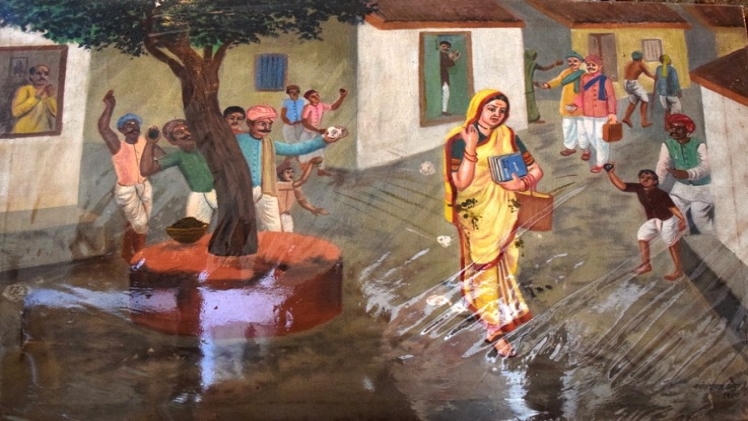
Jyotirao Phule and Savitribai Phule were eminent social reformers of colonial India. They are the pioneers of women’s education in India. If you search for questions like, “Who started women’s education in India?” These two names will appear as pioneers of women’s education in India along with Baba Saheb Ambedkar.
Just like every social reform, the path leading to creating social awareness in favour of women’s education was riddled with difficulties and challenges. But they continued despite discouragement and condemn and perpetuated their endeavours focusing especially on the marginalised classes. Their efforts were directed mostly towards the betterment of women, children, and people from the marginalised castes.
Knowing Jyotirao Phule- The man who started women’s education in India
It is important to acquaint oneself with who started women’s education in India and everything that these two people did to uplift the Indian women. Here is some key information throwing light on the background of these great social reformers.
- Jyotirao Govindrao Phule was born on 11th April 1827.
- He was born in the Mali caste which was one of the lower castes in the Shudra Varna.
- He started his education at a Marathi school and graduated from a Mission school in 1847.
- The very next year he started a school for girls from lower castes.
- His father married him off to a girl from his community when he was only 13.
- His wife was Savitribai Phule, 11 at the time of marriage.
- With his wife, he started awareness and social reform campaigns that influenced the likes of Dr B.R. Ambedkar and even Mahatma Gandhi.
Eventually, he earned the title of “The Father of Social Revolution”. Dhananjay Keer wrote his biography in 1974. He earned the name Mahatma Jyotiba Phule in 1888, two years before his demise.
Knowing Savitribai Phule- The woman who started women’s education in India
Savitribai Phule and Jyotirao Phule were barely adolescents when they were married. But they were not an ordinary couple lost in the norms of society. Unlike the couples of their time, they were aware and enlightened souls. With their numerous and relentless initiatives, together, they changed the lives of millions of people, especially that of the women in India.
Here are some important facts about the early life of Savitribai Phule.
- She was born on 3rd January 1831 in the Satara district in Maharashtra.
- She belonged to a lower caste of the Shudra Varna, the same caste as Jyotiba Phule.
- Unlike Jyotiba Phule, she did not receive any education or literacy primarily because she was not only a person from a lower caste but also a girl.
- Getting married to Jyotirao Phule was a turning point in her life because he educated her personally.
- Eventually she educated herself in Pune’s Normal School and took a teacher’s training programme at an American missionary institute in Ahmednagar.
- At the age of 17, with her husband, then 19, she opened the first Indian school for women.
- In 1852, she started the Mahila Seva Mandal, a community that aimed for women’s empowerment and equality across castes.
- She started teaching girls in Maharwada.
- She died of the bubonic plague in 1897 (7 years after the demise of Jyotiba Phule), while catering to victims of the plague.
The couple was aided by revolutionary feminist, Sagunabai, who was also Mahatma Jyotiba Phule’s mentor.
Contributions of Jyotiba and Savitribai Phule who started women’s education in India
This revolutionary couple has made immense contributions to raising awareness through their life-long struggle and fight for women’s rights and abolishing casteism. Here are some of the ways in which they helped the country:
- In the 1850s, they started women’s education in India through Native Female School for promoting the education of Mahars, Mangs, and Etceteras.
- They founded two more girls’ schools in 1851.
- They founded a night school and a school exclusively for “untouchables” in 1852.
- The couple started the Balhatya Pratibandhak Griha where Brahmin widows susceptible to honour killings could safely deliver their babies.
- The couple adopted a child (Yashwant) from their own shelter.
- They started the Satyashodhak Samaj (Truth Seeker’s Society) in 1873.
- They passionately advocated widow remarriage and condemned child marriage.
Influence through Literature
Both of these social reformers who started women’s education in India were also writers.
- Savitribai Phule influenced the youth through her poetry. Kavya Phule was published in 1854 when she was 23. Bavan Kashi Subodh Ratnakar was published much later in 1892. She inspired the lower classes to seize their rights through poems like Go, Get Education.
- Jyotiba Phule wrote in Marathi for the lower castes to be able to read. He exposed the systemic exploitation of lower castes by Brahmin priests through Brahmanache Kasab (1869). Gulamgiri (1873) is a detailed account of the slavery that was prevalent during the time.
They both influenced and encouraged the people who belonged to the marginalized community from the colonial days with their words while leaving no stone unturned to support them with their actions.
Influence in Politics
Jyotiba Phule had become a member of the Poona Municipality in the year 1876, and he held the position for five years. During this entire time, he kept strategizing ways to build support for the marginalised community. This is when he envisioned how lower caste Indians could retake power from the Brahmins at the communal levels during the British reign.
He focused on social and civil reforms and urged the lower classes to not try to get involved in political arenas because he realised that during the British reign, even high caste Brahmins did not have any real control over the country and its rules.All Movies HD Download free from here Coding
Legacy
The Savitribai Phule scholarship enables the education of socially backward girl students. Both Savitribai and Jyotiba Phule relentlessly pursued justice for the subaltern. Both Savitribai and Jyotiba Phule were visionaries who had laid the foundation for women’s education in India. They were also the votaries for widow remarriage in the western part of the country. They had untiringly battled to see the end of casteism, and thereby led the way to a free and empowered India across every stratum of the social matrix.
A quick fact: The Maharashtra Government has sanctioned INR 20 crores for a biopic on this powerful couple. Let’s hope it will do justice to their endeavours and everything they stood for.



